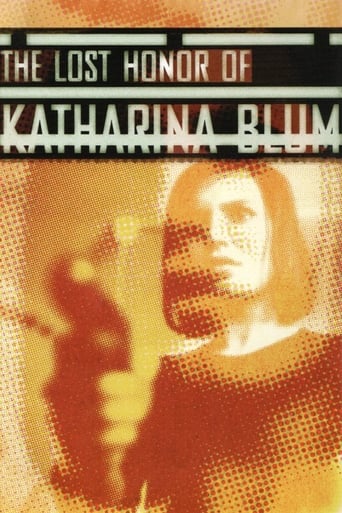

In the early 1970s, West Germany was having quite a problem with what was known as the Baader-Meinhof terrorist gang. Author Heinrich Böll wrote an article criticizing what he saw as the German tabloid Bild-Zeitung's fear-mongering tactics in their reporting of the activities of the Baader-Meinhof gang. Subsequently, Böll was called a terrorist sympathizer, and the police began checking him out as if he were a criminal. This provoked Böll into writing a novel, also called The Lost Honor of Katharina Blum, which was to serve as a parable for the consequences of "yellow journalism" and fascist-leaning police actions. The subtitle of the book was the over-ambitious "How violence can arise and what it can lead to".Filmmakers Volker Schlöndorff and Margarethe von Trotta knew and empathized with Böll so they began to put the film into production immediately. I haven't read the novel, so I can't compare the two, but unfortunately the film, at least based on the English language translation, comes nowhere near its goals in terms of political or social commentary.Here's how the story begins per what we actually see on the screen: a man--he turns out to be Ludwig Götten (Jürgen Prochnow)--who is behaving mysteriously/covertly finds his way to a party. At the party, he hooks up with a swinging trio consisting of an apparent Arab and two women. They then head to another party, where Götten runs into Katharina Blum (Angela Winkler). They stare at each other oddly and dance slowly. The Arab heads off to the bathroom, reports to whoever is listening on the other side of his wire that Götten and Blum are together, and we see Götten and Blum subjected to surveillance as they leave together to go to her apartment. In the morning (I'm not sure why they'd wait until morning), police, including armed men in something like riot gear, storm into Blum's apartment, planning on absconding Götten. But Götten is gone. So they take Blum in for questioning. It seems that Götten is a suspected terrorist and they want to know what Blum's relationship is to him. Blum ends up briefly imprisoned.At the same time, a local tabloid paper, simply called "The Paper" in the English-language subtitles, at least, begins printing trumped up stories about Blum, occasionally even completely fabricating quotes from interviewees. As in the novel, the gist of the film is supposed to be that the treatment from the police and the newspaper are "ruining Blum's life".It's certainly true that the police and the journalists shown in the film get a bit out of line. However, their transgressions are relatively minor, especially compared to other filmic depictions of such things. Blum is never strong-armed by the police, for example. Compared to the real world, there are no molestations with broomstick handles here. The journalists do not do anything unusual for tabloid journalists. I can't remember when it started publishing, but The Weekly World News sure fabricates stories a lot stronger than "The Paper" in Katharina Blum does, and it's not as if The National Enquirer, say, hasn't been successfully sued for slander/libel. On the other hand, The National Enquirer hasn't exactly ruined lives, either. That would be quite an exaggeration.It's not clear why Blum answers the police's line of questioning without objecting more vehemently or alternately refraining from talking and incriminating herself. I'm not sure what Germany's laws are, or were, on that. No one tells us that Blum has to respond to the police in the way that she does, and she certainly doesn't try very hard to do otherwise.If we look at things from the police's perspective for a moment, Götten is supposedly a terrorist. While we're not shown anything confirming this, we're not shown anything denying it, either. We don't know what kind of evidence the police have on Götten. And here is a woman who is apparently helping him out. So, obviously, they're going to question her, and police will ask you all kinds of questions that you don't have to answer. As shown in the film, it is suggested that Blum is actually lying about the extent of her interactions with Götten. If she just met him, many plot points make little sense. Further, Schlöndorff and von Trotta suggest in subtle ways that Blum's circle of acquaintances might not just be ideological leftists. Given all of this, the police aren't really shown doing anything out of line except asking questions that Blum wouldn't have had to answer.The Paper gets more out of line, but we're actually only shown a couple incidents where they change words in someone's statement. The idea is that Blum is being tried and convicted in the tabloid. Yet, "tried and convicted in the press" is hyperbole, certainly. Blum remained free. She wasn't proved guilty of anything. The emotional turmoil she experiences (which leads to a much improved climax) seems more a result of her own odd disposition (and the character is quite odd and somewhat volatile in the film) than blamable on stories in the newspaper. The only person who ruins Blum's life is Blum.If you haven't seen the film yet, it might seem odd that I'm hanging on narrow points so much. You're probably saying, "But what about the plot? Isn't this a good, suspenseful film?" The bulk of the film consists of the police questioning Blum and reporters trying to interview her family, friends and associates (although that takes up a lot less time than the police questioning Blum). This is nothing if not a "talking head" film. It succeeds or not largely based on that talking. There are stretches where the talking is engaging, even if it's not making the point that Schlöndorff and von Trotta want to make. It's a good idea, and could have worked with a better script. But there's not much else to praise, including the technical elements, which are just average.
... View More"The Lost Honor of..." not only tells an interesting story with powerful writing, acting and cinematography, but is also a must see for those disturbed by the powerauthoritarian governments (communist, fascist, and everything in between) possess to exploit individual human rights. I wish we could view this film as a well made relic of the past, but unfortunately its subject matter is as relevent today as it was in 1970's West Germany. As in Katarina's world, terrorism is again the favored epithet of the day as the U.S.'s social and political climate moves away from a conversation between differing individual view points and towards an 'on message' insistence on absolute conformity.Katarina is a young maid with little money, who sleeps with a man she barely knows, a man who is under surveillance as a suspected terrorist. Because she was seen with the supposed terrorist, her life is torn apart by police interrogators and a press that only reports "facts" which support its particular ideology, even if the details must be fabricated. Although those who know Katarina tell the press and police of a bright, sweet, and quiet girl, her reputation is run through the gutter by the men who translate her private life to the public world. Eventually, Katarina takes on the attributes of a stereotypical terrorist because the state has given her no choice but to become radicalized. Simply because Katarina will not give up her dignity and privacy, she becomes an enemy of the state.For Katarina, her private life becomes glaringly public, and the public judges her based on both the fabricated evidence presented by her accusers (both press and government) as well as their own assumptions about how a woman should behave. In the society that surrounds Katarina, the state functions through conformity, and those who do not conform instantly become the enemy. As a woman, Katarina bears the brunt of this brutality, as her sexuality becomes both exploited and demonized. The young maid becomes a media fixation, a beautiful sexual terrorist.Although much of this might sound familiar, the film relates these political and social paradoxes on an individual, personal level. As in Katarina's case, sensational news stories rarely investigate the cogs which make them front page headlines-they only reinforce easy reactions of judgemental outrage. "The Lost Honor of ..." shines a bright light on the lives that are trampled beneath the broad strokes of an unyielding and inhuman militarized state and the press and public which supports it.
... View MoreApart from its general and still (i.e. now more than ever) valid attacks on the scrupelous tactics of tabloid journalism, this movie is also very valuable as a time piece about German society in the 1970's, when the country was shaken by fear of terrorist assassinations and everything considered anti-Democratic (meaning left-wing). In this way, the film not only takes into question the missing morality of tabloid journalists, but also the loss of human rights in a society bothered with questions of homeland security (parallels to the current situation in the U.S. are obvious). Katharina Blum is not only destroyed by the merciless press abusing her for sensationalist journalism, but also by a police and judicial system that doesn't value an individual's right of privacy anymore, and even less the principle of innocent until proven otherwise.A film of exceptional quality (even though the acting isn't convincing at some times), "Die verlorene Ehre der Katharina Blum" is strongly recommended to every thinking movie fan with an interest in the abuse of power in our not-so-democratic society.
... View MoreThis film is based on the novel of the same name by the German author Heinrich Böll. The book is purported to be written by Böll as a result of an ongoing feud in the German media between Böll and the publisher of the German daily tabloid the Bild Zeitung, a publication known for its lurid and sensational reporting of the news. In his story, Böll attempts to show how damaging irresponsible journalism can be to the lives and reputations of innocent persons caught up in the tide of current events.The story begins with Katherina Blum attending a party where she meets and is strongly attracted to a young man. She invites him to her apartment and they spend the night making love. The next morning, the young man has gone and the police are storming her door seeking to arrest the overnight guest as a terrorist. Instead, Katherina is arrested and taken to the police station for interrogation as his accomplice. The young terrorist has been killed and Katherina is unable to prove that she had no knowledge of his activities. A tabloid reporter becomes obsessed by the case hounds Katherina, mercilessly destroying her reputation and any semblance of a normal life. The emotional tension continues to build, finally reaching a violent climax.This is a very powerful and well made film. Böll's message regarding sensational and irresponsible journalism is very clear. After suffering along with the innocent Katharina through the insult, pain and dishonor of her ordeal, I came away from the film with an altered point of view toward tabloid journalism and commercial news reporting in general. In a world where reporters are being found guilty of manufacturing news stories, media agencies are providing dramatic reenactments of sensational news events, and names like O.J. Simpson and Monica Lewinsky are used as teasers to improve the ratings of news programs, this film is a must see.
... View More